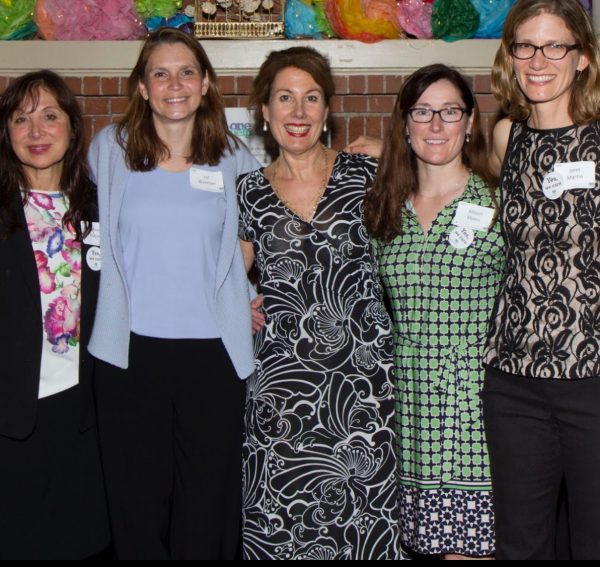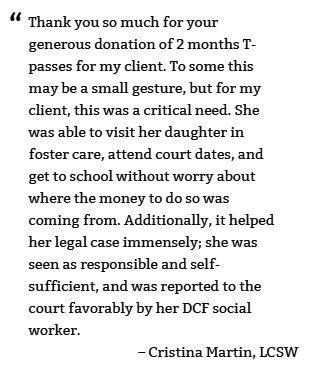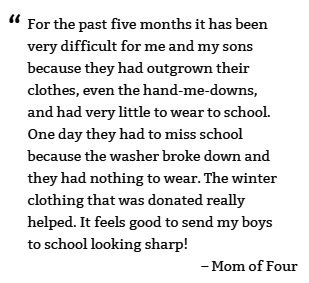Changing Lives One Small Step at a Time

Twelve years ago, Anne Bader-Martin, a court-appointed attorney in the juvenile court system, sat in a Dunkin’ Donuts with one of her clients. The girl was fifteen, pregnant, and determined to keep the baby, so the two of them were making a list of essential items for the impending birth. The girl kept bringing up a stroller she wanted, but Anne tried to steer the conversation back to the basic necessities. As they were preparing to leave, Anne felt a tap on her shoulder and a man who had overheard them handed her a check. “Buy her the stroller,” he said.
“I realized then that if only people could see the need and the people I work with, they would want to help,” Anne says. “So I thought of a way to do that.”
Shortly after, Anne teamed up with some of her colleagues—a group of court-appointed attorneys, social workers, and friends—and founded the nonprofit One Can Help, where Anne serves as Executive Director and Board President.
One Can Help was the response to issues the group had seen countless times through their work in the juvenile court system, where 80% of families and children live below the poverty line. Often, families and children struggled to thrive because they lacked simple resources that the court system was unable to provide, such as bus fare to get to job training or much-needed counseling, or funds to get the electricity turned on or to pay for after-school activities to keep kids off the streets.
“We created One Can Help because of the tremendous need out there to provide resources that really aren’t available and really make it hard for children and families to take positive steps forward,” Anne says.

Since 2006, One Can Help has assisted more than 3,000 children and families in Middlesex County by partnering with court-involved professionals and inviting them to formally apply for funds to help meet the unique needs of their indigent clients. Applications are reviewed by a team of volunteer attorneys and social workers using standardized criteria, and Anne says One Can Help typically provides assistance within one to three days.
Because One Can Help’s model requires very few staff, 95% of donations received go directly to people in need. The model is also scalable and now, having received so many requests from around the state, One Can Help has started to provide resources throughout the Commonwealth.
In 2011, Anne attended one of the Clearinghouse’s nonprofit seminars, where she learned about the Clearinghouse’s Legal Referral Program, which pairs nonprofits with attorneys from area law firms. One Can Help didn’t have any specific pressing legal needs, but Anne was interested in receiving general guidance as the organization continued to grow and receive more requests for help.
Anne was paired with WilmerHale attorneys Jonathan Wolfman and Stephanie Singer, who helped her create the infrastructure she needed to handle more employees and answered questions she had about board structuring, governance, the tax implications of donations, and anything else she could think of. Even now, years later, Anne still reaches out to Jonathan and Stephanie from time to time, and she says they are fantastic and always happy to help.
“It’s been a pleasure working with Anne and her team over the last few years,” Stephanie says. “They are a true testament to how much good can be done with even the smallest of grants, and how a committed group of volunteers and donors can make a huge difference in the lives of children. We’re honored to contribute via providing pro bono legal services and enjoy doing what we can to help the organization succeed.”

In its first year of operation, Anne says One Can Help received two requests for assistance. Now, they average 400 a year, thanks largely to word of mouth within the juvenile court system. But there’s one case that stands out to Anne: that of a teenager who she first met when he was a child with no family, living in group homes and in and out of foster care.
As his court-appointed attorney, Anne applied for assistance from One Can Help multiple times over the course of ten years. The funds he received have allowed him to travel out of state for a baseball tournament, pay the application fees for community college, purchase a computer and textbooks for school, pay for a T pass, and get his belongings cleaned after a bedbug infestation. Though seemingly small when viewed individually, each bit of assistance helped propel him forward, and today he works as a pharmacy assistant.
That is what it all comes down to for Anne: that together we can help and that small amounts of assistance, provided at the right moments, can make such a huge difference in people’s lives.
“We all need to realize that it’s very difficult to make it if you don’t have resources or stable supports behind you,” Anne says. “No one makes it on their own. We have to have empathy; we have to understand that not all of us have it so easy.”
In addition to WilmerHale attorneys Jonathan Wolfman and Stephanie Singer, Anne credits One Can Help’s dedicated staff and OCH’s board members and advisors, and knows that without them, none of this would be possible.